Exploring co-production for social change
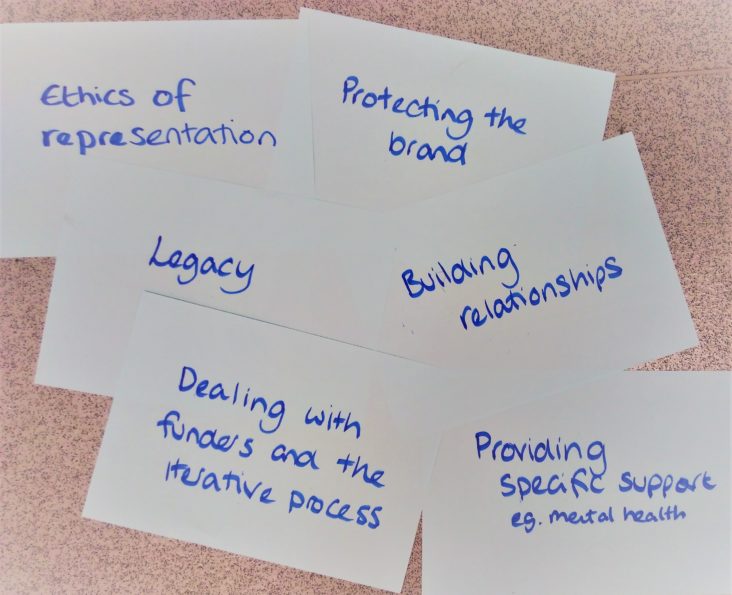
In January 2019, our Affiliate Chester Zoo hosted a session for the Happy Museum (HM) Community of Practice exploring the subject of Co-Production for Social Change.
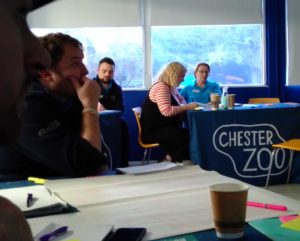 The workshop was an experiment for the HM community – offering the host, Chester Zoo, the opportunity to explore a question of interest to its team, with input from and sharing learning from across the museum and cultural sector. As well as the Discovery and Learning team from Chester Zoo, and contributors from Affiliates the Museum of Homelessness, Encounters Arts, Battersea Arts Centre, the group, of around 30 participants, included representatives from the National Trust, Curious Minds, Royal Pavilion and Museums (Brighton and Hove), University of Central Lancashire, Storyhouse, Edsential and Leicester Museums.
The workshop was an experiment for the HM community – offering the host, Chester Zoo, the opportunity to explore a question of interest to its team, with input from and sharing learning from across the museum and cultural sector. As well as the Discovery and Learning team from Chester Zoo, and contributors from Affiliates the Museum of Homelessness, Encounters Arts, Battersea Arts Centre, the group, of around 30 participants, included representatives from the National Trust, Curious Minds, Royal Pavilion and Museums (Brighton and Hove), University of Central Lancashire, Storyhouse, Edsential and Leicester Museums.
The day started with a walk through the zoo to the learning centre – with both participants and zoo team enjoying the opportunity to be amongst wildlife on route to work!
Charlotte Smith, Head of Discovery and Learning at Chester Zoo, welcomed participants outlining the zoo’s primary mission, preventing extinction, and how the team was seeking to develop their practice in relation to co-production and broaden and deepen their thinking by connecting with the exciting range of co-production experience in the room.
Participants formed into small groups and interrogated what co-production looks and feels like in practice – sharing real examples and using a listening process to identify what was happening when co-production is in ‘flow’. We mapped the outcomes of this discussion – here are some of the key factors that we identified as important:
- Communication – in particular listening
- Being brave, anticipating and accepting change, and supporting risk-taking
- The vital importance of time in building relationships
- Genuine ownership of the process by the participants
- The value of good and clear process from the start
- Creating a safe and supportive space
- Positivity and enthusiasm
- Clear real world goals and outcomes for all
The group explored what social change we are seeking – and why is it important that it is co-produced. Whilst Chester Zoo had a clear and identified central mission, many museums’ social purpose was more diffuse and harder to articulate. There was an interesting dichotomy between ambitions to work with new groups and audiences balanced with the energy and drive that came from self-selecting collaborators.
Values of co-production for social change we identified included:
- The benefit of more knowledge, experience and perspectives in the room
- A sense of ownership and deeper commitment from participants
- The benefit of the knowledge and understanding of participants about what works for and speaks to them
- A community to support each other leading to more sustainable change
One participant observed ‘co-production is not an option – everything our museum is and has is owned by citizens’ – another commented ‘we cannot effect social change alone’.
We then heard case studies covering a wide range of co-production practice.
Bethany Haynes, Senior Producer at Battersea Arts Centre (home of the Moving Museum) whose mission is to inspire people, to take creative risks, to shape the future.
Bethany outlined the shared the theatre-based ‘scratch’ process which underpins their work
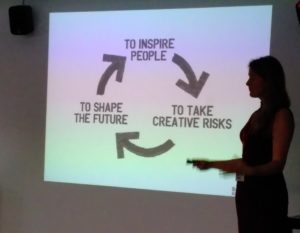 The Scratch process… is a way of approaching problems, activities, even organisational structures. It gives you the freedom to fail, the capacity to experiment. It is also an essentially shared and communal process. It allows participants to constantly evaluate their activities and provide critical feedback.- David Jubb, Artistic Director and CEO of Battersea Arts Centre
The Scratch process… is a way of approaching problems, activities, even organisational structures. It gives you the freedom to fail, the capacity to experiment. It is also an essentially shared and communal process. It allows participants to constantly evaluate their activities and provide critical feedback.- David Jubb, Artistic Director and CEO of Battersea Arts Centre
The Agency Programme at BAC supports young people to make their entrepreneurial ideas a reality and Bethany outlined how she works to ensure that participants in the programme have agency and ownership at all stages of the process. Their challenges include the levels of support needed by participating individuals, the sustainability of particpant projects beyond the programme and the reputational risk to their brand of taking such an open approach. Reiterating the value of process she explained how Scratch allowed participants to test out their ideas, and BAC to relinquish control, within a trusted structure.
A new programme The Activists will help BAC invistigate how museums can drive social change – using their collections and resources to support communities to lead change.
We then heard from Matt Turtle, co-founder of the Museum of Homelessness a social justice museum set up with a mission to tackle the stigma and prejudice associated with homelessness. Co-production underpins the development of the museum with individuals with lived experience of homelessness co-writing the organisational plan and developing the ongoing programme of activities. He noted that funders had found this approach challenging at times as plans changed and outcomes differed from those projected at the outset. There were also ethical considerations in working with people to use their own lived experiences to produce creative work. Describing a recent exhibition, Objectified, he showed how the facilitation had embraced elements of control and lack of control in the same space.
Like Bethany, Matt articulated a desire constantly explore the devolving of power. Working as it does with established therapeutic processes, he described the museum as a safe space to be unwell.
We then heard via skype from Shelley Castle, an Associate at Encounters Arts based in Devon. Their aim is to create the conditions for a creative, caring, connected world in which all can learn to flourish, living together within the Earth’s ecological limits. Shelley described several co-produced projects, Brixham Baker Boys bringing together lads from the ages of 8-15 to work together and learn the art of baking bread in an outdoor cob oven, The Museum of Now in Torquay, working with local residents and culminating in an exhibition of unique objects hand made entirely from local, natural or recycled materials by people who live or work in the town and finally Fish Hawkers which revealed the hidden lives of the women working in the fishing industry over the past 150 years in Brixham and the marine life that supports the industry.
Several themes emerged from the description of these projects. All involved an engagement with head, heart and hands – she described the power of making together to open up sometimes difficult conversations. She stressed the importance of working with existing experts in the community, and of sharing back the outcomes of the project – there is great power in moments of celebration and performance, reflecting back the success of a project to its participants, their families and community.
In all cases projects developed from the seed of an idea, with direction emerging through the process and the concerns of the participants driving the outcomes – for example in Fish Hawkers the community used the creative process to voice concerns about local fishing industry, the loss of fish stocks and sea pollution.
We then heard from Charlotte about the work of Chester Zoo. Using the work they have done around Sustainable Palm Oil and Sing for Song Birds as examples she discussed the challenges of moving from an institution led approach to one that opened itself up to participants to be their own voice for change. A key issue was maintaining the balance between the vital expertise of the Zoo on what are very complex issues, and the need to allow participants to create their own messages. This had occasionally led to activities being ‘off message’ but the tension was held in balance by excitement at the unexpected directions which the campaigns had taken and the energy and engagement of participants.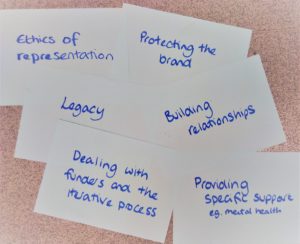
Participants then headed out into the Zoo – to walk and talk in small groups led by zoo team members – with a focus on challenges of co-production for social change which had emerged from the shared case studies.
Sharing these on their return the following were identified:
- The vital importance of building long-term relationships
- The need to consider legacy from the outset – how can support be maintained and if not how can outcomes be sustainable
- The value of long-term evaluation – and the challenge of making it happen
- Letting go and being open to risks, safeguarding etc
- Power dynamics, equality of voice and the ethics of representation
- Dealing with funders when managing an iterative process
- The value of the welcome and invitation – hospitality, quality, aesthetics
The final exercise of the day was a self-evaluation and planning exercise where participants were asked to define:
- A thumbs up – something they liked
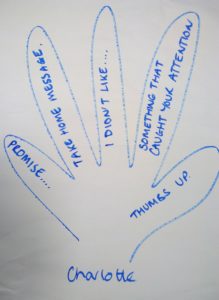
- Something that caught their attention – to point out to others
- Something they would improve or didn’t like about the day
- Something that will stay with them – a take home message
- An action – or ‘pinky promise’ – something they plan to do differently
Some commons themes emerged:
The case studies and the willingness of participants and presenters to share their ideas and work with others came out strongly as something people liked about the event, alongside the opportunities to walk in the zoo and share ideas across different sectors but with like minded people.
Take home messages included the importance of taking risks and accepting changes in direction. The importance of listening, valuing everyone’s input and working with participants were noted.
Charlotte talks here about her journey from museum to zoo practice, and the learning she identifies between the two. Commenting on the success of the day she observed:
‘From my perspective hosting the event at the zoo was a really efficient, both in terms of staff time and financial resource, a way of providing a large number of my team with some quality bespoke training. It’s really useful when you’re doing something that is about changing the way you work to involve a large number of your team – the conversations they are now having with each other are so much richer than if just one or two people had attended something. I would definitely recommend the model to others and would be up for doing it again at some point.’

